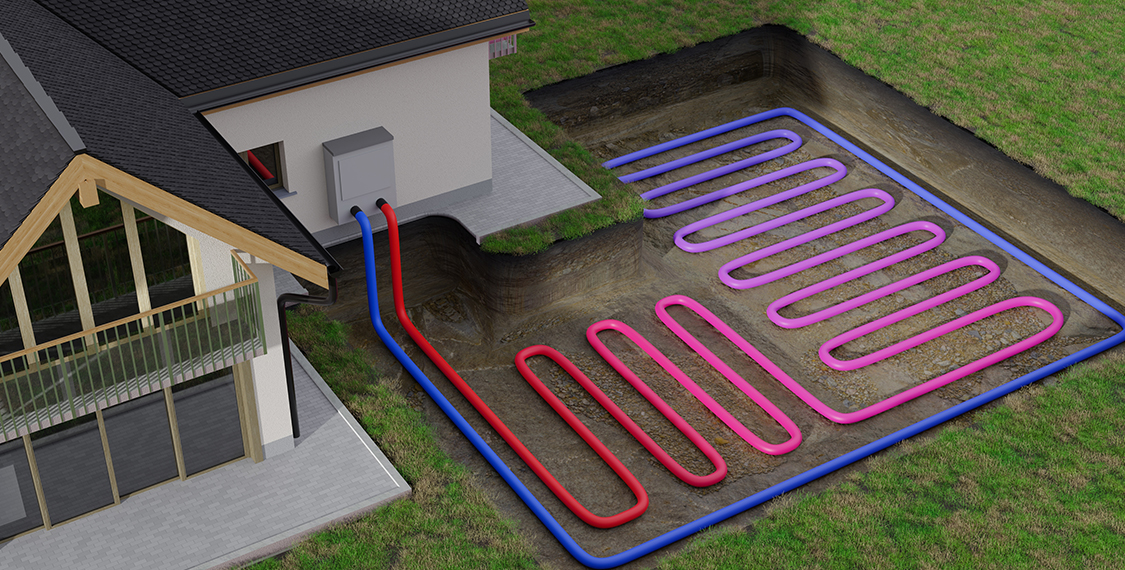Fast & Efficient Geothermal Installers In Palm Coast
If this environmentally friendly, cost-effective technology intrigues you, our HVAC contractors would be happy to install a geothermal system in your yard. We will bury pipes filled with water 6 – 10 feet deep underground to prevent freezing.
The best part about geothermal systems is that they transfer heat rather than produce it. Unlike furnaces or air conditioners, geothermal systems are highly energy-efficient. They do not require fuel or electricity to operate – allowing you to save money on monthly energy bills. Even better, geothermal installers help you do your part in saving the environment by reducing your carbon footprint. Contact Cook’s Air Conditioning & Heating Specialists for professional geothermal installation for your home or commercial business!
How Does A Geothermal System Work?
After a geothermal system is installed, the heat pump circulates liquid through pipes deep underground, sometimes called “loops.” These loops absorb the temperature distributed into the ground from the sun. From there, the fluid in the pipes is circulated back up to the geothermal heat pump, which heats or cools your home. In the summer, heat is taken from the house into the liquid and back into the ground, while in winter, the heat from the liquid is extracted and distributed around the home. These systems do not require fossil fuels or a lot of electricity.
Parts Of A Geothermal System
Geothermal Loop
When the outside air is either scorching hot or blisteringly cold, your underground temperature remains relatively constant year-round. A geothermal loop is a path of pipes, containing water or a mixture of water and antifreeze, that travels deep enough to reach the consistent temperatures underground. Geothermal loops circulate the liquid in the pipes, bringing either heat or cold to your house.
Geothermal Heat Pump
The geothermal heat pump is your system’s central hub machine and includes the compressor and heat exchanger. Your heat pump’s main role is to transfer the liquid in the geothermal loop, which moves heat through the system.
Benefits Of Geothermal Heating And Cooling
Improved Safety
Unlike furnaces, geothermal HVAC systems do not need combustion, flames, or fossil fuels to operate. Instead, geothermal systems use natural heat from the ground to warm your household. This safer heating method can reduce your risk of a house fire or carbon monoxide poisoning.
Quiet Operation
Geothermal systems are mostly underground for noiseless operation. Enjoy unmatched temperature control with a device that is quieter than a refrigerator!
Minimal Maintenance
Our advanced geothermal systems are installed underground. This shields them from inclement weather and corrosion. If your system does require maintenance or HVAC repairs, our team is always prepared to change filters, fix damaged parts, and clean coils as needed.
Return On Investment
Palm Coast homeowners who invest in a new geothermal system can earn their investment back in energy savings and reduced utility bills. You can also apply for tax credits when you own a geothermal heat pump. This cost-effective system is well worth its cost!
Geothermal System Frequently Asked Questions
What Makes A Geothermal System Different From Ordinary Systems?
While conventional heating systems typically burn fossil fuels, such as natural gas, propane, or oil, for space heating, a separate air conditioning system is used for cooling. On the other hand, geothermal heating and cooling systems have one geothermal heat pump, which heats and cools using the constant temperature of the ground to produce maximum efficiencies in heating and cooling modes. So, rather than burning fossil fuels to generate and expel heat from the house, a geothermal system transfers heat to and from the earth to provide a more efficient, affordable, and environmentally friendly method of heating and cooling your home.
How Deep Are The Geothermal Ground Loops Buried?
In Florida, horizontal closed-loop geothermal systems are typically buried 6 to 8 feet deep and spread out over a relatively large area. These systems can be installed in long, narrow trenches or a broader rectangular excavation, with a looping pattern similar to that used in radiant floor heating. In contrast, vertical closed-loop systems extend much deeper, usually between 300 and 450 feet per borehole. While most single-family homes require just one or two vertical loops, larger homes and commercial buildings may need many more to ensure sufficient thermal exchange with the ground. For example, a large commercial building might have over 100 boreholes, each spaced about 20 feet apart and extending 400 feet underground—roughly equivalent in depth to the height of a 40-story building, all hidden beneath a parking lot.
If The Geo System Runs On Electricity, What Happens If Power Goes Out?
For perspective, all modern central heating and air conditioning systems—including geothermal systems—depend on electricity to operate. Even many wood stoves use electric blowers. That means when the power goes out, so does your heating or cooling—unless you have a backup generator. The good news is that geothermal systems can run on a backup generator, and we can help ensure your generator is properly sized to handle the load.
Will The Geothermal System Increase My Electric Usage?
Your electric bill will go up, but it will still be just a fraction of what you were spending on your previous heating system.
What Makes Florida Perfect For Geothermal Installation?
Florida groundwater maintains a higher year-round average temperature than groundwater found in northern states. As such, geothermal systems can draw from this warm groundwater all year long. In the summer, the groundwater can serve as a heat sink. Likewise, in the winter, this same groundwater can be a heat source for the system to draw upon. Ultimately, Florida’s groundwater temperature allows for geothermal systems to function at optimal levels during every season!
